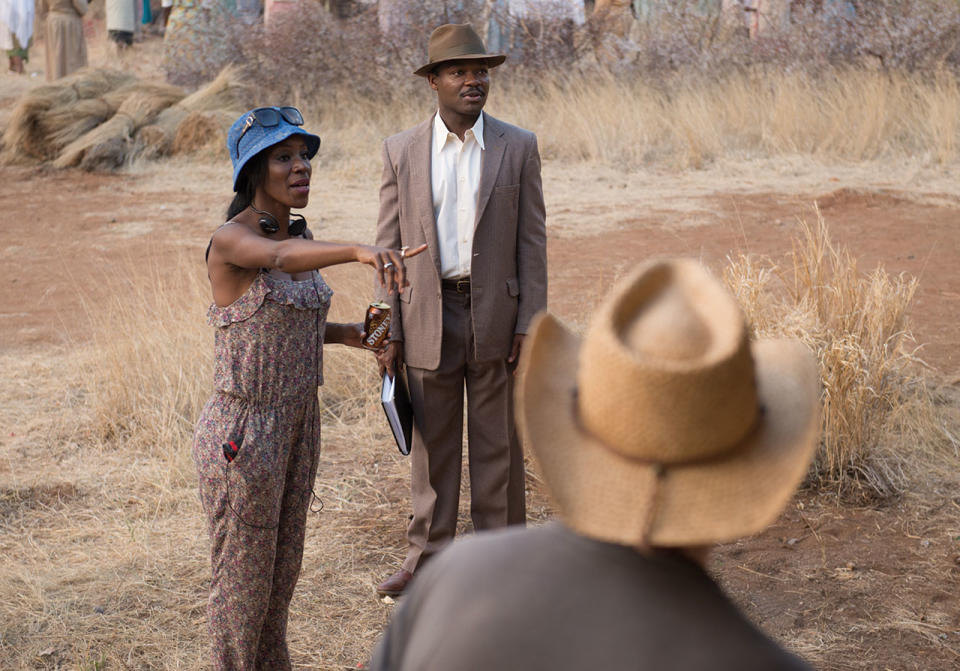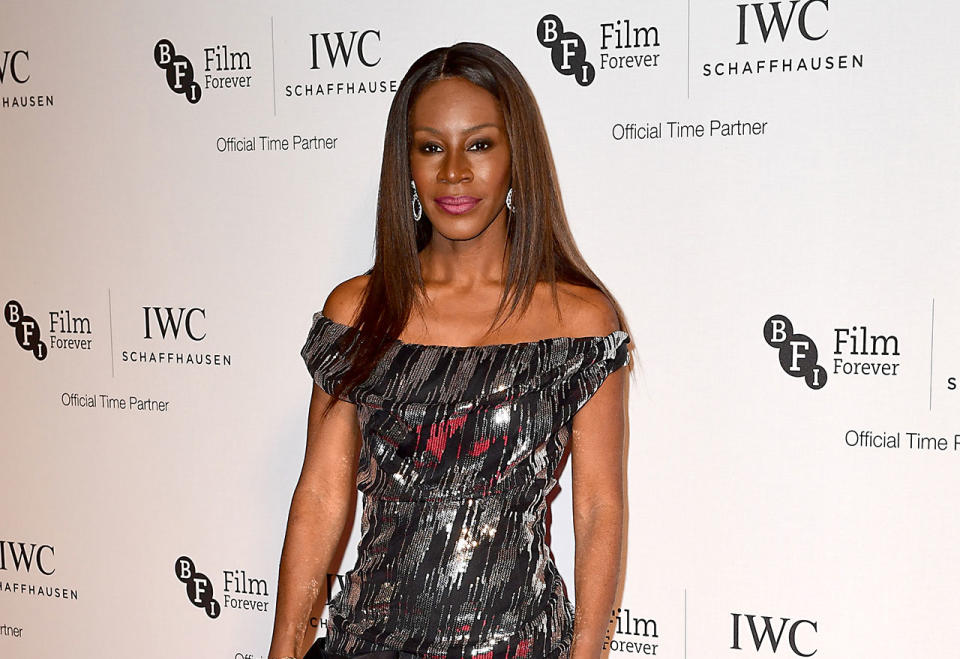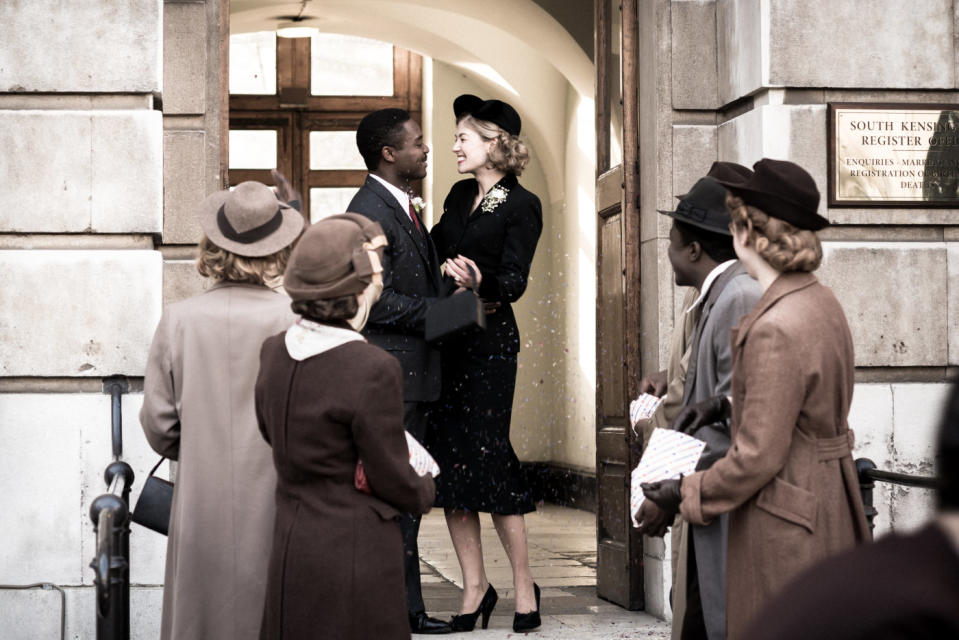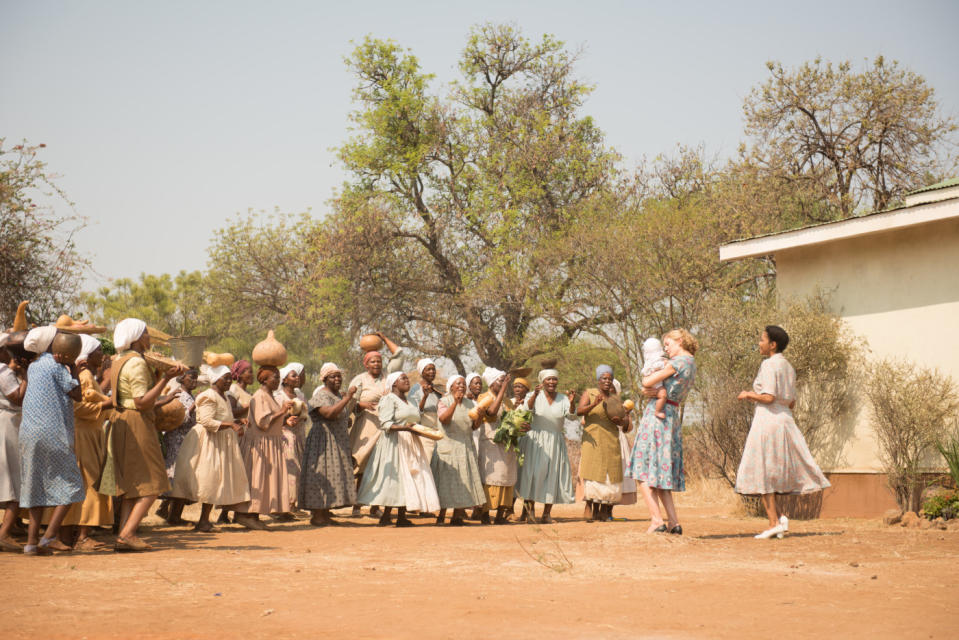IWD 2017: A United Kingdom director Amma Asante shares inspirational 'Be Bold For Change' advice


Amma Asante is one of the most exciting directors working in the British film industry right now. The former ‘Grange Hill’ star made her feature debut in 2004 with the critically-acclaimed ‘A Way of Life’, which she recently followed up with ‘Belle’ in 2013, and 2016’s ‘A United Kingdom’ which arrives on Blu-ray and DVD 20 March.
The stirring true-life story of Ruth Williams and her marriage to Seretse Khama, the king of Bechuanaland (now Botswana), starring Rosamund Pike and David Oyelowo opened the 2016 London Film Festival making Asante the first black female director to open the 60-year-old festival, earning rave reviews in the process.
Why things are improving for female filmmakers
Wonder Woman set visit report
BAFTA moves to improve diversity
It’s a story that tackles race, class, love, but also the complex socio-political climate of post-war Britain and its crumbling empire, in a way that’s never been seen on screen before, and that’s all down to Amma’s unique perspective.
Yahoo Movies spoke with Amma about ‘A United Kingdom’, but also about equality and parity in the British film industry as one of the most influential female filmmakers working today, and she had some inspirational words of wisdom to share.
Yahoo Movies UK: The theme for International Women’s Day 2017 is “Be Bold For Change”, what’s the best piece of advice you can offer for a female filmmaker hoping to break in to the industry?
Amma Asante: Just be courageous. Being bold is about being courageous.
It’s about believing and trusting in your voice, trusting in your belief system, trusting in the value of that and that what you have to say is a valuable contribution to the overall world we live in.
Lena Dunham, the creator of ‘Girls’, told me not so long ago that as women we’re raised to believe everybody else, to trust everybody else, but not ourselves, and I felt like I had an epiphany moment when she said that, because I think that’s quite true.
What’s sometimes the hardest thing to do is to trust in your own voice and trust in your own instincts. And yet instinct is what will make you unique, it’s what will allow you to contribute something uniquely yours to the wider world that we live in.

I remember a producer saying to me when I was concerned one day about my story being too specific, he told me that in the detail you get the universal. When you really focus on the real detail, the real unique hook of the situation, that’s when the world identifies with it. That’s when it resonates. When you try and do something generic, it’s hard for the rest of the world to connect to what it is you’re trying to say. So trust in your uniqueness and what that unique voice has to contribute to the world.
Have the courage to do that, have the courage to dare to dream, and to turn those dreams into gold by working towards them and believing that they can be a reality. Ultimately it’s about understanding that “no” doesn’t mean that your dream is not worthwhile or your goal is not achievable.
“No” doesn’t mean that your voice isn’t valuable, or that you don’t have something unique and valuable to contribute.
“No” is simply a part of the journey. That’s all it is. It’s an indication that you need to continue, move on, find someone who believes in you and trusts in you to collaborate with and tell your stories.
Telling stories is about collaboration, even if you’re a novelist who sits at home many hours a day writing by yourself, you still collaborate with a story editor, with a publisher all of those things. Surround yourself with the people who trust and believe in you as well and continue holding up your beliefs until you get to where you want to in life.
Do you think things are getting better for female filmmakers in the British film industry?
I think that we’ve been talking about this stuff for a long time and previously we were just doing a lot of talking but there wasn’t enough action behind those words. I do feel like there’s a real momentum now and do feel like we are moving forward by putting action – to a certain extent – behind our words.
I do think things are changing but I do still think we’ve got a long way to go. There still aren’t enough reflected in terms of storytellers behind the camera, but also stories that are being told about women on screen for actresses to be able to play.

Considering that we’re a marginalised group but we’re not a minority, that’s a big deal. We’re 50% of the population, 51% at times, and yet we only represent oftentimes less than 10% of stories. When it comes to telling the stories, that’s even worse.
Automatically we realise that that’s an unequal situation. Morally, obviously the right thing to do is to change that, but also from a business point of view, it’s really important that we change it. It’s really important that we open up the perspectives that our stories are told from and who they’re told about, because that means when you go to the cinema, or you’re looking at Blu-rays, or going to the cinema on a Saturday evening you have greater variety to choose from.
Also just in terms of the world that we’re living in, we’re living in a world where there’s so much talk about disconnection, there’s so much talk about boundaries and walls and territories, and who belongs where, that one thing that films can do is to tear down a lot of those constructs and say ‘why don’t you imagine what it might be like to walk in the shoes of an 18th century black female and see what life was like?’
And if I can take you through her experience and move you, or if I can take you through the experience of an African prince in 1947, it might just mean that seeing that world through somebody else’s perspective just closes up some of the gaps that we have in terms of how we see each other and how we relate to each other, and that’s important in storytelling.
It’s important – I think – as a business model. It’s important morally as well.
Congratulations on ‘A United Kingdom’, it’s a fantastic story, but I was a little bit disappointed with myself that I didn’t already know it – is that something you’ve heard a lot?
Yeah, that seems to be the reaction of a lot of people and it definitely was my reaction when I first came across the story of Ruth and Seretse. But in a way it’s not surprising that it’s not known widely because oftentimes stories of the empire, they’re not really told from any other point of view other than those who were perceived to have the power at that time, and who were in charge of writing the history books.
So, in a way it’s not surprising that we wouldn’t know it because I feel like we’re only just getting to a point now where we can tell these stories from slightly different points of view.
Both Seretse and Ruth are fascinating characters – what sort of research did you do into them?
The film is based on the book ‘Colour Bar’ which was written by Susan Williams who’s no relation to Ruth Williams. That was the main source of my research. It’s a really dense fascinating book, like amazingly fascinating in the way that the politics entwined with the love.
There’s so many forms of politics in the story because there’s the local politics in Africa, the international politics that we have between three countries on two continents, there’s the family politics in England, there’s the politics of the women in Africa. There’s so much of that entwined. So that was my main research for the book, but you want to get hold of the research, the real paperwork, the real images, all of that kind of thing, you want to get your own hands on it, as opposed to seeing it through somebody else’s eyes.

Once I’d finished reading Susan Williams book it was really important to me to got to her and say ‘look, I’d love to see some of the real research, I’d love to look at the research that you used, and the research you based your book upon.’ When I read the book I could only read 18 pages a day because it was so dense and needed time for my brain to somehow analyse all of the stuff. Then of course I embarked on my own research when I was in Botswana and in the UK separate to Susan Williams’ research as well, just because you want to be able to tell a story from your own point of view through your own gaze and not just through somebody else’s.
That meant being with historians in Botswana who were really focussed on the white side of life, and historians who really focussed on the black side of life. Then I had to make sure that there were people that we spoke to in Parliament as well over here in the UK to understand how certain things worked.
What I like to do when I’m doing research is to really understand the context of the character. So sometimes the things that you might think wouldn’t necessarily have an impact, sometimes they do. So as an example, I was really interested in the fact that we were two years post-World War 2 in this story. And I was interested in what impact that might have had on Ruth as a woman because she had obviously existed in a time when men had been taken out of the equation because they were all at war. So that meant that women suddenly had all these opportunities that they hadn’t had when men had previously been around.
I love the fact, for instance, that Ruth had volunteered to be an ambulance driver during the war. That she was an insurance clerk which was seen as quite a good job for a woman in 1947, and actually she was in quite brave roles when it comes to what women had been allowed to previously do during the war, and I think that slightly feminist context, of seeing herself outside of the boundaries that would have been placed on women prior to the war was really fascinating to me.
I tried to somehow feed that into her ability to yearn for something beyond her comfort zone, beyond her four walls really.
Ruth particularly is particularly inspiring with it being IWD – she’s a woman unafraid to make her own decisions, who speaks her mind – was she like that In real life?

Definitely, one hundred percent. I think that she might even have been slightly more so in real life than we were able to portray in one hour, fifty minutes on screen. She was very much that way. And if you think about it, she probably had to be to have existed in an environment where there was no Internet.
There were atlases, there were encyclopaedias, and that was how you got your information about other parts of the world, and to be able to almost blindly get on a plane because of this love that she felt, because she was compelled by this love, to have the courage to do that… in many ways when I think of Ruth I don’t feel like Ruth said yes to the first man who asked her to marry him. I feel like she found her soulmate, she found the soul that her soul had fallen in love with, and she chose to be courageous enough to not let it go like many of us might have. We might have said, ‘I love you very much but a life in a completely different country, in a completely different world is not something that I’m strong enough to face. So it was really nice knowing you, thanks and goodbye’ and gone for somebody who was much more like her, seemingly, on the surface, who was British and would live their life together in this country.
But she chose to go beyond that and break down borders in many ways, and I think that’s powerful. I also think what was very important for me in the film was to show an element of sisterhood in the film. Not just with her blood sister, but with the women of Africa. We know that Ruth went on to earn their respect in a very, very massive and important way. She went from being their would-be Queen that they would have been very uncomfortable about to becoming their beloved First Lady. And that’s really important.

The other women in the story, the African women in the story, are often women in that period that we don’t paint as having political views or political ideas but they did have political views, and they did have political ideas, and of course they didn’t really fit alongside Ruth’s actions very well. But what I also wanted to show in this theme of knocking down borders and showing connections, not just somehow we create disconnections as a construct in our lives. It was also showing that those women in the villages in Africa, they also had to exist quite often in a world without men, because men often worked in mines in South Africa. So the women were often left to do jobs that would have been perceived to be man’s work in other parts of the world, like building the houses where they lived within the village. That was women’s work even though traditionally it would be seen as men’s.
So I wanted to show that somehow within, although they seemed different on the surface, the women had similarities in the way that they had to live their lives because they had to be brave, and they had to be bold, and they had to do work that was often considered men’s.
When I looked at the newspaper articles that I read about Ruth in Life magazine and other magazines, and articles in the Times, sometime they were just small articles, sometimes they were really big, she was definitely this bold character who spoke her mind, and spoke up for what she believed in. And she had a lot to believe in, that was the great thing, she had a lot of opinions and that in itself was bold for a woman to express.
We also spoke with Birds Eye View’s Mia Bays for IWD, she says that films made for women is an underexploited area, she also said that films made by women offer different perspectives, do you agree with that?
Yes, most definitely. I’ve only ever lived inside of my experience, I’ve never lived outside of my experience, but what I do know is that my sensibility as I applied it to this film meant that different things, different elements of the film were brought out and introduced that wouldn’t have previously been there, because it was an all-male team that was working on it prior to me coming on board.
The elements of sisterhood as I’ve described them, both in Africa and in the UK, the elements of the context of the woman in 1947 in the UK and Africa, where women weren’t allowed to vote in Botswana, Bechuanaland, but they did have political views. It’s very easy to think, ‘well, women aren’t allowed to vote so they don’t have political views, but as a woman and a woman who is the child of an African woman who was raised in a colony, I know that they had political views in Africa, so I wanted to portray that.

So, my background is both a woman, and woman of colour, and a woman who derived of children who were raised in a colony that saw it become the first sub-Saharan African country to gain independence. It’s relevant and important.
But I also like to think that the way that I wanted to approach the politics was perhaps seeing it through different views, because we have all of these rules in terms of screenwriting: if you start a movie, or a story, or a script in a particular way, you’ve got to follow that path, you should only see it through the protagonist’s point of view, and you mustn’t… there are all these rules that people have and those rules were mainly written by men.
So what happens is when you come along as a woman and you see it in a different way, and it’s very important to ensure that this story is driven from Ruth’s perspective, but you get much more illumination in terms of that perspective if you also understand what the British government was going through, and what they were up against, and why they were cornered.
If you understand the elements of what uranium meant to the UK at that time, what South Africa’s gold meant, what the Cold War unfolding meant to the UK, then you understand just how much the couple was up against, how powerful the elements were that the couple were up against, and then you understand how strong their love was. That they would stand up against all of those political elements and all of those worldly important elements.
That holistic view that I quite like to see things from different points of view, and maybe break the rules that had previously been written is something that those of us that haven’t traditionally been allowed to take the lead in telling stories, I think are able to do now.
‘A United Kingdom’ is out on Blu-ray and DVD 20 March.
Read more
Women who challenged sexism on the red carpet
2017’s most inspiring feminist icons
Why I’m raising my son as a feminist

 Yahoo Movies
Yahoo Movies 
